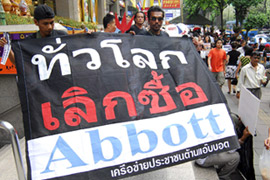US presses Thailand on drug patents
Washington blacklists Thailand for breaking patent on US Aids drug.

Published On 2 May 2007
Countries on the list are under extra scrutiny and could face trade sanctions if violations worsen.
Ralph Boyce, the US ambassador to Thailand, said the blacklisting reflected US concerns that Thailand had been weakening its approach to the protection of copyrights and intellectual property rights.
He said the breaking of the patent on the Aids drug was one of the concerns that prompted Washington to place Thailand under extra scrutiny.
Emergency
According to World Trade Organisation agreements, governments can issue compulsory licences which allow the manufacture, import and sale of cheaper generic versions of drugs in case of a national public health emergency.
 |
| The boycott by drug maker Abbott Laboratories sparked an angry backlash [EPA] |
Such actions have been taken by several countries for Aids medicines.
Thailand in January issued compulsory licences for two drugs – a heart disease medicine and the Aids drug Kaletra produced by US drug maker Abbott Laboratories.
Officials said the decision was made because the government could only afford to provide the expensive Aids drug to one-fifth of the 500,000 people living with HIV in Thailand.
Abbott responded by declaring it would not introduce any new drugs in Thailand because its intellectual property rights were not honoured.
The move was met by protests in Thailand and in the US during its annual shareholders meeting.
The company later offered to sell Aids drugs at a lower price, apparently in exchange for the lifting of the compulsory licensing.
US criticised
Critics have condemned the Bush administration for protecting the pharmaceutical industry.
Essential Action, a US-based health activist group, called the US stance “outrageous, cynical and shameful”.
| “The message is that Thailand should back down – but worse, that other countries should not dare to follow Thailand’s example”
Essential Action, US-based health activist group |
“By using legal methods to authorise price-lowering generic competition on overpriced Aids and heart-disease drugs, Thailand has shown the world what it means to place public health over commercial considerations,” the group said.
“The message is that Thailand should back down – but worse, that other countries should not dare to follow Thailand’s example.”
Thailand was on the US “priority watch list” in 1989-1992 but had been on the less serious “watch list” for the past 15 years over piracy and copyright infringement, particularly of movies, music, software, books and brand-name fashion wear.
On Tuesday, the Thai government said it would hire a US public relations firm to improve its image abroad.
Some analysts have suggested one reason for the move may be to counter attempts by US pharmaceutical companies to shame Thailand for breaking drug patents.
A lobby supporting the US pharmaceutical industry placed an advertisement in the Wall Street Journal last week criticising Thailand’s breaking of patents.
Source: News Agencies